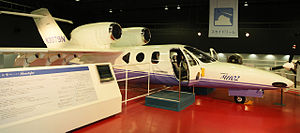The Honda MH02 was an experimental business jet built by Honda, in cooperation with Mississippi State University, to research engine placement and composite construction. The prototype was completed in 1992, making its first flight on 5 March 1993.
| MH02 | |
|---|---|
 | |
| General information | |
| Type | Experimental aircraft |
| Manufacturer | Honda Mississippi State University |
| Status | Retired |
| Number built | 1 |
| History | |
| First flight | 5 March 1993 |

The MH02 was never intended for production, but was nonetheless the first all-composite light business jet to fly; by 1996 over 170 test flight hours were accumulated on the airframe. Aside from the already unusual above-the-wing engine mounts, the design features a T-tail and a forward-swept wing.[1] The aircraft was deregistered and exported to Japan in 1998.[2][3]
Specifications (MH02)
editGeneral characteristics
- Crew: one or two pilots
- Capacity: six passengers
- Length: 11.25 m (36 ft 11 in)
- Wingspan: 11.24 m (36 ft 11 in)
- Height: 4.18 m (13 ft 9 in)
- Max takeoff weight: 3,600 kg (7,937 lb)
- Powerplant: 2 × Pratt & Whitney Canada JT15D1 turbofan engines, 5.3 kN (1,200 lbf) thrust each
Performance
- Maximum speed: 654 km/h (406 mph, 353 kn)
See also
edit- VFW-Fokker 614: Twin overwing jet engines
- HFB 320 Hansa Jet: Forward-swept wing
References
edit- ^ Warwick, Graham. "Opening doors" Flight International, 9–15 January 2007.
- ^ "Aircraft Data N3079N, 2015 Cessna 208B Grand Caravan EX C/N 208B-5205, Honda R & D Co Ltd MH-2 C/N 001".
- ^ "Aircraft Inquiry".
External links
editWikimedia Commons has media related to Honda MH02.